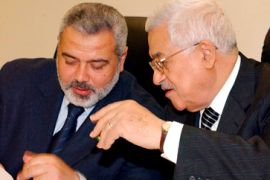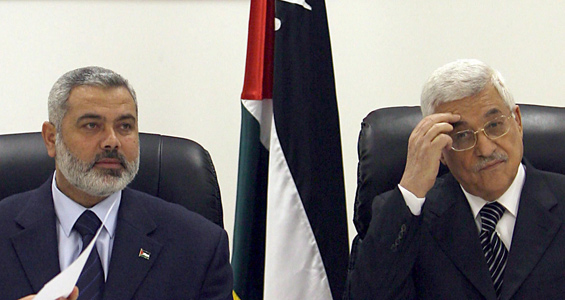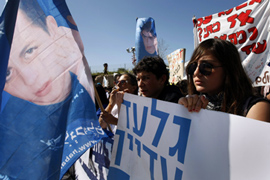A slight pause for national unity
Palestinian leaders insist Cairo-hosted unity government talks have not failed.


Negotiators say Haniyeh’s Hamas and Abbas’ Fatah are still focused on national unity [EPA]
After ten days of marathon talks on how to reach a comprehensive deal on national unity, senior figures from Palestinian factions Hamas and Fatah and other independent figures have decided to take a break and return to the West Bank and Gaza for “further consultations”.
Unity talks are expected to resume, possibly as early as next week, Al Jazeera has learned.
Palestinian politicians are physically exhausted and in need of a break after a series of negotiations lasting to the early hours of dawn. But that is not why they have announced this suspension.
During the talks, representatives of 13 Palestinian factions – as well as independent politicians, academics, and businessmen – met in five separate committees to discuss all the issues related to ending the political division that has paralysed and polarised Palestinian politics since the Hamas takeover of Gaza in mid-June 2007.
Around 180 politicians and independents from the West Bank, Gaza and across the Palestinian diaspora participated in these committees.
They held talks unprecedented in their depth, reaching agreements on small and complicated issues alike. After completing their work, these committees reported to the steering committee, composed of the most senior politicians and independents, to detail areas of agreement and disagreement.
Rays of hope
After a week of talks, hopes were high that a unity deal was close after the announcement that the factions and independents had agreed to form a government of national consensus, whose composition would enjoy the support of all. Most likely, this compromise was reached because of the nature of the tasks this government would carry out.
 |
| Palestinians do not take sides in divisive times for fear of losing sight of the occupation [AFP] |
The government of national consensus will be transitional, in power only until the end of January 2010 as the Cairo talks have also produced an irreversible agreement on January 25, 2010 being the date when presidential and parliamentary elections should be held.
In other words, the government of consensus would be the bridge to national unity, through which the wounds of division can begin to heal and the Palestinian voter can regain his or her right to decide which direction the nation must go.
It is a government that will barely have time to begin implementing the very early stages of what is expected to be a five-year effort to reconstruct Gaza if Israel lifts the choking siege on the Gaza Strip.
Palestinian leaders are well aware that the likelihood of the upcoming right-wing Israeli government, led by Benjamin Netanyahu, lifting the siege is very slim.
Differences remain
Real and difficult questions remain unresolved. Senior Palestinian and Egyptian sources have voiced their frustrations that a deal on a national unity government has not been reached and that the March 20 deadline set by Egypt will be overrun.
Others argue that extending the talks will only ensure that the agreement announced afterwards will endure.
The main point of disagreement – what political programme a transitional government will have – remains.
It is not about changing the agendas of Hamas or Fatah, the main rival factions.
Hamas and other factions maintain that the coming government should suffice with the formula of the 2007 Mecca Agreement, whereby the government respected the previous commitments of the Palestine Liberation Organisation (PLO), which include the recognition of the state of Israel.
Fatah and other Palestinian factions insist that this formula is unacceptable to the international community, resulting in severe international economic sanctions, which have crippled the Palestinian Authority.
US influence
Omar Sulaiman, Egypt’s most senior intelligence official is currently in the United States, attempting to gauge the position of the administration of Barack Obama, the US president, about the Cairo developments.
 |
| Israel has tried to effect Gilad Shalit’s release by breaching Palestinian politics [AFP] |
Unity talks are expected to resume once Sulaiman returns to Cairo with clear answers that could influence what compromise Palestinians reach about the programme of their unity government.
This is perhaps the most ironic aspect of Palestinian reconciliation efforts.
After all, Palestinians remain a people under occupation who have so far held two presidential and two parliamentary elections that the world has recognised as democratic and fair.
The world, however, failed to respect the choice of the Palestinian people. Instead, the world replied with what many international experts described as the most severe international sanctions regime ever designed.
It was also the first sanctions regime of its kind ever employed against an occupied people. The fear of sanctions and international retribution is in many ways hampering what have been by all accounts sincere Palestinian efforts to reach national unity.
Meanwhile, Israeli forces have intervened once again in domestic Palestinian politics, detaining nine senior Hamas officials – five of them elected Parliamentarians.
Israel has made no secret its intention to employ as much pressure as it can on Hamas to force it into a swap deal for the Israel soldier, Gilad Shalit, captured in June 2006.
Public pressure
At every corner in the West Bank and Gaza, ordinary Palestinians talk about one thing – the latest from Cairo.
After two years of disappointment and political violence, ordinary Palestinians are frustrated and tired of their political leaders.
In fact, opinion polls show just how much the main factions have lost popularity and credibility because of this division.
The public steers away from them when divided because they distract from the Palestinian people’s main cause – ending the Israeli occupation.
They believe division weakens them as they attempt to end a 42-year-old occupation that has left them isolated, financially dependent and losing their land to illegal Israeli settlements inch by inch, day by day.
I speak to the senior leaders and independents in Cairo on a daily basis. I know they are aware of this very harsh domestic reality and the severe consequences failure will have.
That is why they were quick to clarify the talks have not failed. They are taking a break.
The public will take their assurances with a pinch of salt, believing the good intentions of the leaders when they see them announcing a unity government.